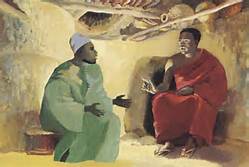“Heavenly Sign Posts”

Genesis 12:1-7 (12:1) – March 5, 2023
I can vividly remember not knowing where on earth I was going. Oh, I’ve lived either in Chicago or Evanston for my whole life. I would diligently and lovingly take care of daily needs for my family. I worked at several jobs both before and after seminary. I was a faithful lay leader at various churches where I worshiped before seminary.
But, I vividly remember feeling that I had no direction, no heavenly sign post. Not knowing where God wanted me to go, or what I was supposed to do. That was for at least ten years, all during my 30’s. I would seek direction from God on a regular basis, and I did a great deal of what I term as “wilderness wandering.”
Have you ever sought direction from God? Did you want a heavenly sign post?
Our Scripture reading for today is from Genesis 12, back in the first book of the Bible. We are talking about Abraham, except this is before Abraham was given that name by God. He was still Abram at this point, and Abram did not really know God, the God who created heaven and earth. We overhear God talking to Abram: “The Lord had said to Abram, “Go from your country, your people and your father’s household to the land I will show you.” God gave Abram a heavenly sign post. “Go from your country!”
If you or I had received a heavenly command like this, chances are our initial reaction would be really scared! And, really serious. “Movement is required. Movement means change, which is always difficult and scary. So this is a [command] about faith and about trust and the willingness to commit to the discipleship path.” [1]
Wait a minute, God! Who said anything about discipleship? I was asking for general directions! Not for turning my whole life upside down and inside out! You want me to be a committed disciple of Yours? Right now? Is that what this command is all about?
This command from the Lord is only a partial command, but it is imperative. The command “Go!” has a great big exclamation point after it! Sure, the Lord is not specific about the exact ending place where Abram is supposed to end up. But, God does want Abram to get going! Get into action.
Could God be nudging us – urging you – or me – to move? To get into action on God’s behalf? We do not have any of Abram’s internal dialogue, and we are not sure about his state of mind and heart at this time. And, “God doesn’t seem to ask for certainty. We don’t have the questions he must have asked, at least in his own head and heart. All we have is his action – “So Abram went…” That’s it. He went, and he believed. He went as the Lord had told him.” [2]
Sure, clergy and missionaries and chaplains are understood to be “called.” And, they often get led specifically in the Lord’s directions. God often does give these people heavenly sign posts. However, Abram was not any of these things. He was not a priest, or a missionary, or a chaplain. Have you ever sought direction from God? Did you receive a heavenly sign post? Abram certainly did! He got a firm command from God, too!
With me, I had a good many responsibilities in my 30’s, including taking care of an aging, frail mother and her older sister. Sure, I may have yearned to get going and get moving for God. But, looking back on my 30’s with 20/20 hindsight, I think I was exactly where God wanted me at that time. God did not want me to go anywhere else, to step out and go like Abram. God wanted me right where I was, in Chicago and Evanston, doing what I was doing. Faithfully caring for my mother and my aunt, and being a mom to my children. Plus, I was an active lay leader in church, and taught piano lessons on the side, for added ministry and service.
Suppose you are uncertain of exactly what God wants from you. Lay person, or clergy person, it doesn’t matter. “God doesn’t want us to wait until we are certain. God doesn’t want us to figure it all out first, to download the maps and chart our course; he wants us to move. “Move where?” we ask. Anywhere. Somewhere. As the Lord has told us.” [3]
Sure, this “going forth” requires a certain amount of trust, and some would say faith. Another fair assessment would be belief. This involves intellectual understanding. “To say it another way, “I believe that gravity exists or that this chair will hold my weight.” There is another connotation to belief that is at least as helpful. There is “belief” in the sense that Abram had—the belief that God is guiding or the Spirit is leading, even when we do not fully intellectually comprehend everything.” [4]
Do you have that much belief? Can we believe God? Can you and I take this promise, this command from the Lord as God’s word to each of us, individually? Moving or staying in one place, doing what God wants us to do? We also know that God commands us – each of us – to do justice, to love mercy, and to walk humbly with our God. And, God is calling each of us to be ready to go, to step forward, on the way that God has for each one of us.
What a wonderful adventure! Heavenly sign post or not, we can all be ready to travel with God. Are you ready? Amen!
(Suggestion: visit me at my other blogs: matterofprayer: A Year of Everyday Prayers. #PursuePEACE – and A Year of Being Kind . Thanks!
[1] https://www.umcdiscipleship.org/worship-planning/learning-to-live-inside-out/second-sunday-in-lent-year-a-lectionary-planning-notes
[2] https://www.umcdiscipleship.org/worship-planning/learning-to-live-inside-out/second-sunday-in-lent-year-a-lectionary-planning-notes/second-sunday-in-lent-year-a-preaching-notes
[3] https://www.umcdiscipleship.org/worship-planning/learning-to-live-inside-out/second-sunday-in-lent-year-a-lectionary-planning-notes/second-sunday-in-lent-year-a-preaching-notes
[4] https://www.umcdiscipleship.org/worship-planning/learning-to-live-inside-out/second-sunday-in-lent-year-a-lectionary-planning-notes/second-sunday-in-lent-year-a-small-groups


